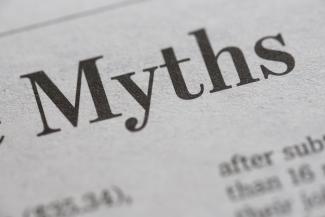
Driven by the evidence, not by rhetoric or anecdote, we describe what the reality of research actually shows to be true.
Myth 1: Cancer is a man-made, modern disease
While it’s certainly true that global lifestyle-related diseases like cancer are on the rise, the biggest risk factor for cancer is age.
Myth 2: Superfoods prevent cancer
Blueberries, beetroot, broccoli, garlic, green tea… the list goes on. Despite thousands of websites claiming otherwise, there’s no such thing as a ‘superfood’. It’s a marketing term used to sell products and has no scientific basis.
Myth 3: ‘Acidic’ diets cause cancer
There’s no good evidence to prove that diet can manipulate whole body pH, or that it has an impact on cancer.
Myth 4: Cancer has a sweet tooth
Both the ‘acidic diet’ and ‘sugar feeds cancer’ myths distort sensible dietary advice. And when it comes to offering diet tips, research shows that the same boring healthy eating advice still holds true. Fruit, vegetables, fibre, white meat and fish are good. Too much fat, salt, sugar, red or processed meat and alcohol are less so.
Myth 5: Cancer is a fungus – and sodium bicarbonate is the cure
The ‘simple solution’ is apparently to inject tumours with baking soda (sodium bicarbonate). This isn’t even the treatment used to treat proven fungal infections, let alone cancer. On the contrary,there’s good evidence that high doses of sodium bicarbonate can lead to serious – even fatal – consequences.
Myth 6: There’s a miracle cancer cure…
From cannabis to coffee enemas, the internet is awash with videos and personal anecdotes about ‘natural’ ‘miracle’ cures for cancer. That’s not to say the natural world isn’t a source of potential treatments, from aspirin (willow bark) to penicillin (mould). For example, the cancer drug taxol was first extracted from the bark and needles of the Pacific Yew tree.
But that’s a far cry from saying you should chew bark to combat a tumour. It’s an effective treatment because the active ingredient has been purified and tested in clinical trials. So we know that it’s safe and effective, and what dose to prescribe.
Myth 7: …And Big Pharma are suppressing it
Whatever the particular ‘cure’ being touted, the logic is usually the same: it’s readily available, cheap and can’t be patented, so the medical establishment is suppressing it in order to line its own pockets. But, as we’ve written before, there’s no conspiracy – sometimes it just doesn’t work.
Myth 8: Cancer treatment kills more than it cures
Let’s be clear, cancer treatment – whether chemotherapy, radiotherapy or surgery – is no walk in the park. The side effects can be tough. After all, treatments that are designed to kill cancer cells will inevitably affect healthy cells too. And sometimes, sadly, treatment doesn’t work. We know that it’s very difficult to treat late-stage cancer that has spread throughout the body, and while treatment can provide relief from symptoms and prolong life, it’s not going to be a cure for very advanced cancers.
Surgery is still the most effective treatment we have for cancer, provided it’s diagnosed early enough for an operation to be done. And radiotherapy helps cure more people than cancer drugs. Yet chemotherapy and other cancer drugs have a very important part to play in cancer treatment – in some cases helping to cure the disease, and in others helping to prolong survival.
Myth 9: We’ve made no progress in fighting cancer
This simply isn’t true. Thanks to advances in research, survival from cancer has doubled in the UK over the past 40 years, and death rates have fallen by 10 per cent over the past decade alone. In fact, half of all patients now survive at least ten years.
More than 96 per cent of all men are now cured of testicular cancer, compared to fewer than 70 per cent in the 1970s thanks in part to a drug we helped to develop called cisplatin. And three-quarters of children with cancer are now cured, compared with around a quarter in the late 1960s – most of them are alive today directly thanks to chemotherapy.
Myth 10: Sharks don’t get cancer
Yes. They do. A female nurse shark, Ginglymostoma cirratum, estimated at 27 yr of age had a 5.5-yr history of a 6-cm black, raised nodular skin lesion located on the right side of the proximal tail. The lesion was diagnosed on biopsy as a slow-growing melanoma of the skin with no vascular invasion. The nurse shark was euthanized for systemic illness approximately 4.5 mo after diagnosis of the dermal melanoma. No evidence of metastasis was found on histopathologic evaluation of the skin and viscera.






